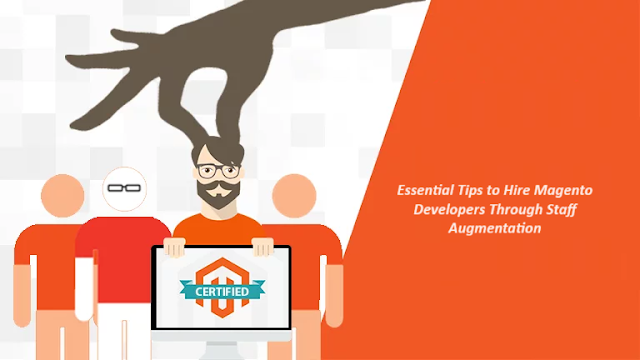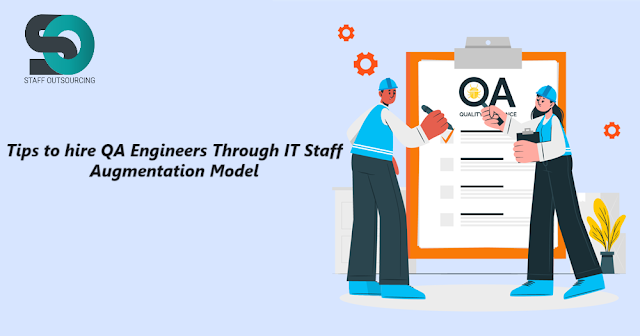Tips to Hire Magento Developers Through Staff Augmentation Model
In today's rapidly evolving digital landscape, having a robust and dynamic online presence is crucial for businesses to stay competitive. For many e-commerce ventures, Magento remains one of the preferred platforms due to its flexibility, scalability, and extensive customization options. However, building and maintaining a Magento-based online store requires specialized expertise, making hiring the right Magento developer a critical task. In recent years, the staff augmentation model has emerged as a popular approach for businesses seeking to augment their in-house teams with skilled professionals. Here are some essential tips to hire Magento developers through the staff augmentation model:
Define Your Requirements Clearly: Before embarking on the hiring process, it's essential to have a clear understanding of your project requirements. Determine the scope of work, specific skills needed, project timeline, and budget constraints. Having a well-defined set of requirements will help you identify the most suitable candidates and streamline the hiring process.
Evaluate Technical Expertise: When hiring Magento developers, technical expertise is paramount. Look for candidates with a strong background in Magento development, including proficiency in Magento 2.x, PHP, MySQL, HTML, CSS, and JavaScript. Assess their experience with Magento extensions, theme customization, module development, and integration with third-party services. Conduct technical interviews or coding assessments to evaluate candidates' coding skills and problem-solving abilities.
Assess Magento Certification and Experience: Magento offers certification programs for developers, including the Magento Certified Developer and Magento Certified Developer Plus. While certification is not mandatory, it can serve as a valuable indicator of a developer's proficiency and commitment to mastering the platform. Additionally, consider candidates' previous experience working on Magento projects, including the complexity and scale of the projects they have undertaken.
Review Portfolio and References: A candidate's portfolio is a reflection of their skills, creativity, and previous accomplishments. Review their portfolio to assess the quality of their work, attention to detail, and ability to deliver projects on time and within budget. Additionally, seek references from previous clients or employers to gain insights into the candidate's work ethic, communication skills, and overall performance.
Evaluate Communication and Collaboration Skills: Effective communication and collaboration are essential for successful project execution, especially in a remote or distributed team environment. Evaluate candidates' communication skills, including their ability to articulate ideas, ask relevant questions, and provide regular updates on project progress. Look for developers who are responsive, proactive, and capable of working effectively with cross-functional teams.
Assess Problem-Solving and Critical Thinking Skills: Magento development often involves tackling complex challenges and finding innovative solutions. Assess candidates' problem-solving and critical thinking skills by presenting them with hypothetical scenarios or real-life challenges encountered in Magento projects. Evaluate their ability to analyze problems, identify root causes, and propose viable solutions within the given constraints.
Negotiate Terms and Conditions: Once you've identified suitable candidates, negotiate the terms and conditions of the engagement, including hourly rates, project milestones, payment terms, and intellectual property rights. Clarify expectations regarding project deliverables, communication channels, reporting mechanisms, and performance evaluation criteria. Ensure that both parties are aligned on key aspects of the engagement to avoid misunderstandings or disputes later on.
Establish Clear Communication Channels: Effective communication is essential for successful collaboration between your in-house team and augmented developers. Establish clear communication channels, such as email, instant messaging, video conferencing, and project management tools, to facilitate seamless communication and collaboration. Define communication protocols, meeting schedules, and escalation procedures to ensure that everyone is on the same page.
Provide Ongoing Support and Feedback: Once the Magento developers are onboarded, provide them with the necessary support, resources, and guidance to succeed in their roles. Offer regular feedback and performance evaluations to help them improve their skills and address any areas of concern. Foster a culture of continuous learning and professional development to keep your augmented team motivated and engaged.
In conclusion, hiring Magento developers through the staff augmentation services model offers numerous benefits, including access to specialized expertise, scalability, and cost-effectiveness. By following these tips and best practices, you can effectively identify, onboard, and collaborate with talented Magento developers to drive the success of your e-commerce initiatives. Remember to prioritize technical expertise, communication skills, cultural fit, and collaboration when selecting candidates, and establish clear expectations and communication channels to ensure a smooth and productive working relationship.



Comments
Post a Comment